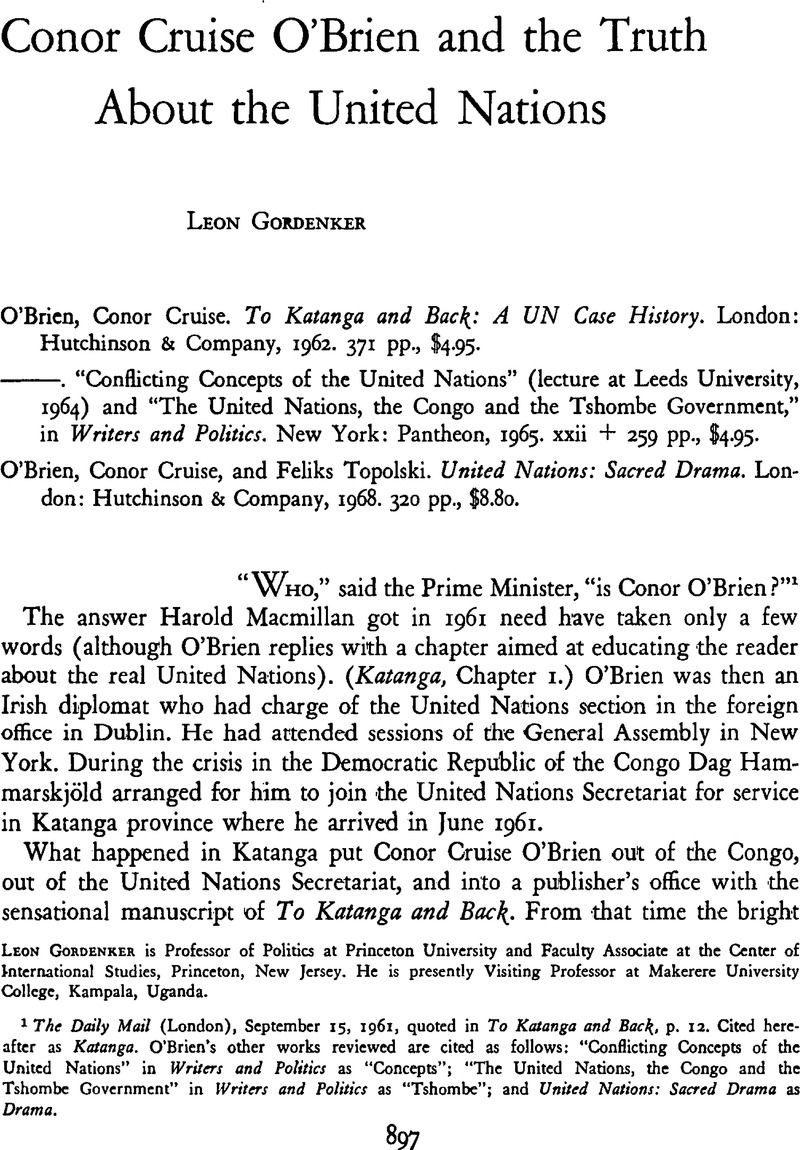Article contents
Conor Cruise O'Brien and the Truth About the United Nations
Published online by Cambridge University Press: 22 May 2009
Abstract

- Type
- Review Essays
- Information
- Copyright
- Copyright © The IO Foundation 1969
References
1 The Daily Mail (London), 09 15, 1961Google Scholar, quoted in To Katanga and Back, p. 12. Cited hereafter as Katanga. O'Brien's other works reviewed are cited as follows: “Conflicting Concepts of the United Nations” in Writers and Politics as “Concepts”; “The United Nations, the Congo and the Tshombe Government” in Writers and Politics as “Tshombe”; and United Nations: Sacred Drama as Drama.
2 Katanga, Introduction. This also refers to earlier, similar articles he published in The Observer (for which The New Statesman, 12 6, 1968 [Vol. 76, No. 1916], p. 783Google Scholar says that he demanded 500 pounds sterling, sight unseen).
3 I leave out of consideration his recent play, Murderous Angels: A Political Tragedy in Black and White (Boston: Little, Brown & Co., 1968)Google Scholar, which also pretends to deal with the United Nations. If it is mere prejudice to believe that scholarship must be designed primarily for reading, not acting, then I am guilty.
4 O'Brien, Conor Cruise, “Mission Impossible”, New York Review of Books, 11 21, 1968 (Vol. 11, No. 9), pp. 8–10Google Scholar. This article reviews Beichman's, ArnoldThe “Other” State Department: The United States Mission to the United Nations — Its Role in the Making of Foreign Policy (New York: Basic Books, 1968)Google Scholar. O'Brien uses the occasion to harass political scientists who write about the United Nations.
5 To the hyperserious I could propose the measurement of books as a neglected dimension of scholarship in international organization. My guess is that O'Brien would make it to the top of the hierarchy with Drama.
6 Nicholas, H. G., in a review of Drama that appeared in International Affairs, 10 1968 (Vol. 44, No. 4), pp. 754–755CrossRefGoogle Scholar.
7 de Sá, Hernane Tavares, The Play Within the Play: The Inside Story of the UN (New York: Alfred A. Knopf, 1966)Google Scholar; and Horn, Major General Carl von, Soldiering for Peace (New York: David McKay Company, 1967)Google Scholar.
8 Just to confirm the assertion, here are some references on the relation of great-power influence and what happens in the General Assembly: Claude, Inis L. Jr, Swords into Plowshares: The Problems and Progress of International Organization (New York: Random House, 1956), pp. 138–140Google Scholar(O'Brien quotes the third edition of 1964 with approval); Goodrich, Leland M., The United Nations (New York: Thomas Y. Crowell Company, 1959), pp. 124–128Google Scholar; Hovet, Thomas Jr, Bloc Politics in the United Nations (Cambridge, Mass: Harvard University Press, 1960)CrossRefGoogle Scholar; Riggs, Robert E., Politics in the United Nations: A Study of United States Influence in the General Assembly (Illinois Studies in the Social Sciences, Vol. 41) (Urbana: University of Illinois Press, 1958)Google Scholar; and Lie, Trygve, In the Cause of Peace: Seven Years with the United Nations (New York: Macmillan Company, 1954), p. 343Google Scholar (also cited by O'Brien). All of these books were available long before O'Brien published Katanga and before Tavares made a deep impression on his office chair in New York.
8 Tavares, p. 291.
10 Ibid., p. 295.
11 Ibid., p. 81.
12 Boyd's, Andrew fine journalistic book, United Nations: Piety, Myth, Truth (Harmondsworth, Middlesex, England: Penguin Books, 1962)Google Scholar; and Lie's memoir.
13 Goodwin, Geoffrey L., Britain and the United Nations (National Studies on International Organization) (New York: Manhattan Publishing Company [for the Royal Institute of International Affairs and the Carnegie Endowment for International Peace], 1957)Google Scholar.
14 “Tshombe”, pp. 215–222. The lecture does not have either the length or the more profound pretentions of O'Brien's main works on the United Nations. Perhaps for that reason it succeeds in conveying O'Brien's basic views very concisely.
15 See, for example, Drama, pp. 243–244.
16 For additional comment see Gordenker, Leon, The UN Secretary-General and the Maintenance of Peace (New York: Columbia University Press, 1967)Google Scholar, Chapter 5.
17 Ibid., pp. 101–102.
18 They also inspire sensational accounts. See Huss, Pierre J. and Carpozi, George Jr, Red Spies in the UN (New York: Coward-McCann, 1965)Google Scholar.
19 He does somewhat better than this but in a different context in Drama, pp. 129–130.
20 United Nations Charter, Article 98.
21 Gordenker, pp. 75–76.
22 Ibid., p. 332.
23 See Gordenker, Leon, “International Organization and the Cold War”, International Journal, Summer 1968 (Vol. 23, No. 3), pp. 357–368CrossRefGoogle Scholar.
- 2
- Cited by




